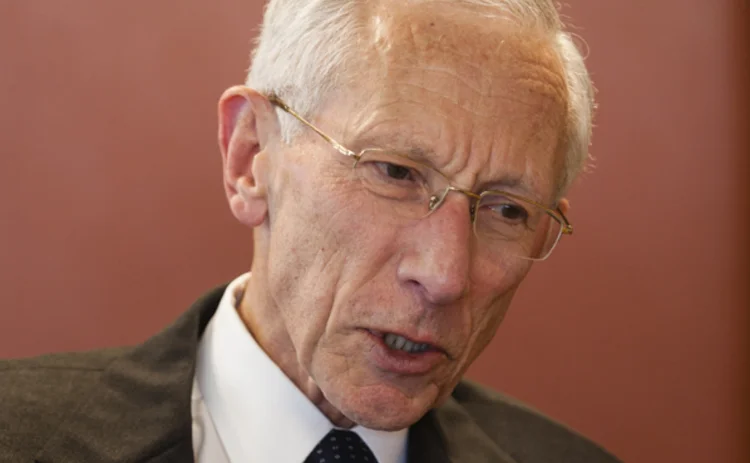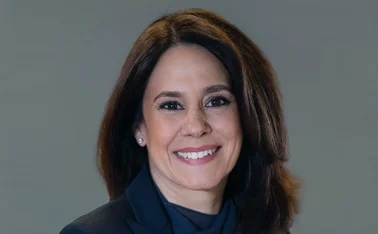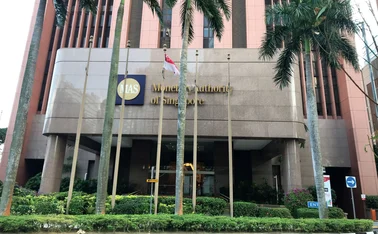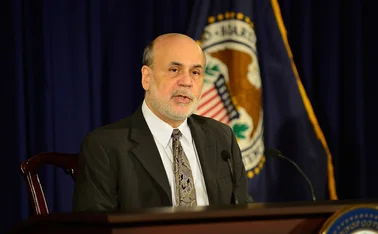
Bank of Israel’s outgoing chief, Stanley Fischer, on the challenges of central banking

One of the first matters you moved to address at the start of your term was to change the Bank of Israel law. It took a while but was passed in 2010. Are you happy with the way it has worked out?
I am very happy. Under the old law, the governor alone made all the policy decisions and all the critical management decisions in the bank. The new law (2010) sets up a monetary committee, with three members from the Bank of Israel and three independent members (in the event, all of them professors of economics, though that is not a requirement for the job) and a supervisory committee, essentially analogous to the board of directors of a normal company or the Court of the Bank of England - people whose job it is to supervise the management. Both committees are working well.
Similarly to many central banks, we have inflation as the central goal of policy, and so long as inflation is under control, we are required to support the other economic goals of the government, particularly reducing unemployment and increasing work, and also closing social gaps - there's a long story about the inclusion of social gaps in the list, but we don't have time to go into it now. Then, subject to the same condition - that inflation is under control - we are required to support financial stability and promote the efficiency of the financial system.
Those are the most important of the changes made in the new law, and they are both important and very positive changes. The main tenets of the law have held up pretty well in the crisis - that's a good stress test of the law. Of course, at the time the law was passed in May 2010, we were already into the global crisis. There is nothing major in the structure of the law that we would need to change, although the absence of a legal framework for dealing with macro-prudential issues might require some amendment at an appropriate time, along with several less significant details that have turned out to be unnecessarily complicated to implement.
Do you think it's the correct template for other countries to have flexible inflation targeting as the main policy goal, followed by subordinate roles for financial stability and government policy?
I believe so. The trouble with inflation is that the process is insidious: in the short run, it rarely seems worthwhile fighting against a small rise in inflation – and that is a process that can and frequently has ended up with the economy in trouble. So the price anchor is very, very important. Our law includes provisions for the inflation targeting approach to be flexible: the inflation target is a range – of 1–3% – and if the inflation rate is outside the target range, the central bank is required to aim to return it to within the target range within no more than two years. In practice, we have aimed to get back to the range within a year when we have been outside it.
Do you believe most of the labour union conflicts and the accusations of graft that were circulating several years ago have been dealt with?
We did succeed in settling the wage dispute that existed in the Bank of Israel when my term started, although that took a few years – longer than I had expected. We have peace on that front now, but we will need to re-examine matters somewhere down the road. Negotiating a labour agreement in the public sector in Israel is very complicated: you have to negotiate simultaneously with three bodies. In our case, one is the union in the central bank, the second is the Histadrut – the collective organisation of Israel's trade unions – and the third is the supervisor of public sector wages, an office that is part of the Treasury. We dealt with the issues that were then on the table. We solved our wage dispute with the supervisor of wages with a ‘generation A', ‘generation B', two-tier wage structure. Existing workers continued pretty much on the existing contract, with some cuts in wages and benefits, while wages were significantly lowered for new workers. It has turned out that the wages for new workers are too low and my successor will have to get an agreement with the wage supervisor to change that, which will not be easy but is essential if the Bank of Israel is to be able to attract workers of the quality the country needs. There was also a tough agreement on excess pensions that had been paid in the past - the Treasury took money back. The agreement was far from ideal, but, by and large, it worked out well. Nonetheless, it will have to be adjusted in future.
The structure of the monetary committee changed from the initial plan to have two parties from the central bank and three externals members. Why was this?
Many Israelis told me ‘you are nuts to think you can run this committee with two insiders and three outsiders because this is Israel and the pressures on the outside members are going to be enormous'. Fortunately, one of the lead negotiators for the Treasury, a senior official, said to me ‘this structure is going to cause you great difficulty'. So we decided on three insiders and three outsiders, with the casting vote for the chairman - the casting vote has been used only once since the committee was set up. The present structure of the committee has worked well, and I'm sure it's better to have the present structure than one in which there would have been a majority of outsiders.
It appears you have your primary mandate in hand at present with inflation at 1.5% for the past 12 months. So what are you doing to maintain financial stability and support government policy?
On financial stability, the main benefit we have is that the bank supervisor reports to me. In terms of the banking system, which is predominant in the financial system, supervisory control is within the Bank of Israel. That feature was introduced long ago, long before the term ‘macro-prudential' had been invented, but it is extremely useful. The law is that the bank supervisor reports to me and I can give him instructions. My working relationship with both the present supervisor and his predecessor has been very good. The supervisor is substantially independent, but he keeps me informed, and by the time he decides on an issue, we typically agree. If the issue has macro-prudential implications, we inform the monetary policy committee and we invite the supervisor for a discussion with the committee on any issue relating to financial stability that he or they want to deal with, but it's not formally required. I'm not sure what we would do if there were a clash between the supervisor and the monetary committee. We would certainly treat such a situation seriously. The bottom line is that the arrangement is not neat, but it has worked well in practice.
On supporting growth, we're at full employment. The main growth-related issue we have to deal with is the exchange rate; and the main issue on the side of financial stability is housing prices. We do what we can on each of these issues. We intervened in the foreign exchange market during the global crisis, and in April this year we again began to buy foreign exchange. In May we launched a program to buy sufficient foreign exchange to offset the effects on the balance of payments – and thus on the exchange rate – of the substitution of cheap Israeli gas for more expensive imported fuels. On the house price side, the bank supervisor has made several regulatory changes that affect the terms on which banks provide mortgages. House prices are, nonetheless, rising faster than we would like. We will continue to look for ways of dealing with that, but the solution to the rising price of houses lies fundamentally on the supply side, which is mainly in the government's domain. In particular, the government should be marketing more land.
What tools do you have at your disposal? Are you comfortable deploying macro-prudential tools bearing in mind your sights are on just one sector of the economy?
That one sector – real estate – has been the source of many financial crises, including the most recent one. So it's appropriate to target that sector of the economy if it's behaving in a way that is causing price rises and the potential for economic and financial instability. That is what macro-prudential is about and if we worry – as we do – that prices in the housing sector are going up too fast, then we should do something about it. What is happening in the Israeli housing sector is not very different from what you're seeing in Singapore, Hong Kong, Australia, Norway, Canada and other countries that didn't have financial crises.
Is there an archetypal macro-prudential tool that you would recommend based on the Israeli experience?
Basically, what we had to do was to raise the cost of financing the purchase of a home at a time when interest rates were reduced to very low levels and mortgage borrowing became extremely cheap. After we reduced the Bank of Israel interest rate in the early stages of the global crisis, the banks began to compete intensely in the granting of mortgages, particularly a floating-rate mortgage, linked to the Bank of Israel rate. The competition reduced the banks' margin over the Bank of Israel rate to six tenths of a per cent. In May 2011 we limited the use of floating-rate financing based on the Bank of Israel rate to one-third of a mortgage package, with the rest linked to five-year real or nominal rates. That may have been the most effective measure we took. In addition, we've constrained loan-to-value ratios (in November 2012), which is a prudential measure. We've also changed the capital requirement against mortgage loans, and there are a few other steps the supervisor of banks has taken.
Some parties argue it is not possible to have macro-prudential policy acting in the opposite direction to monetary policy. What is your experience regarding this matter?
Most of our measures in the housing area have been aimed at moderating the effects of the low Bank of Israel interest rate on the price of housing. The low interest rate was needed to encourage investment and to prevent excessive capital inflows that would have strengthened the exchange rate excessively. The macro-prudential or regulatory measures were designed to offset one of the important effects of the low interest rate. I read that as meaning that the macro-prudential policy was working in a somewhat different direction than the interest rate.
You are vocal in expressing concerns about fiscal issues. Does this not open the door for politicians to criticise monetary policy?
I said very little in public about fiscal policy for the first six years I was governor, because I thought fiscal policy was basically appropriate. In the middle of 2011, it became clear that fiscal policy was going off track, and I began speaking out then, and continued doing so for some time. The law describes me as being the economic adviser of the government, so I believe I have a duty to speak out when necessary – even if that attracts criticism of monetary policy.
You've mentioned some of the problems you've had with the strength of the currency and the Bank of Israel has had to intervene. What sort of intervention do you see moving forward? And in a related matter, what is the appropriate level of reserves for the central bank?
On what are we going to do in the future, our policy is that we will take measures and we will intervene if we think the exchange rate is diverging from its equilibrium level. We reserve the right to intervene and we haven't changed our policy since August 2010 when we moved to intervention that's dependent on market conditions. We did not intervene between July 2011 and April this year.
With regard to the reserve level, Israel is in a slightly different situation to most countries in the sense that our geopolitical situation is different. We believe we need more reserves than most countries, and we have defined the desired range as being between $65-90 billion. We're now roughly in the middle of that range, but we have said that, if we have to, we'll be willing temporarily to go outside that range. There is an issue of how much it costs you to hold reserves. The Swiss, who have intervened massively during the past year, don't have a carry cost because their interest rate is marginally lower than the rate on most of the reserves they hold. We do have a carry cost so we take that into account.
What's the latest thinking on the impact of the Tamar and other natural gas reservoirs – how is this affecting the exchange rate and what are the latest plans regarding a sovereign wealth fund (SWF)?
The government has agreed to set up a sovereign wealth fund. The proposal should be going to the Knesset soon. However, it is only in 2018 that large amounts of money are expected to flow to the SWF. We have announced that until then we will be buying an amount of foreign exchange each year that is equal to our estimate of the impact on the balance of payments of the substitution of Israeli gas for imported fuels each year.
You've also called for some sets of rules on an international level of how people should be intervening in foreign exchange markets, including an International Monetary Fund (IMF) solution. Are matters progressing in this area?
The IMF has done a lot of work on capital flows in the past couple of years and I think they've done good work. In the first instance, they have sought to define - and I think they are defining – what is acceptable practice and what isn't. They have also written several papers on what measures work to restrain unwanted capital inflows and what measures don't. At some point in the future they may be able to present an international standard for acceptable behaviour with respect to capital controls. The Organisation for Economic Co-operation and Development (OECD) has a code of conduct with respect to the capital account, and countries outside the OECD can adhere to it if they want - and that's a creative and useful approach by the OECD. However, as you know, some important emerging market countries are reluctant to be bound by any codes of conduct in this area.
The big issue is beggar-thy-neighbour policy. If a country uses an expansionary monetary policy to encourage growth, it's going to have an impact on exchange rates - you reduce your interest rate, your exchange rate weakens and the exchange rates of other countries therefore strengthen. So that's an inevitable part of monetary policy. If that's being done in order to encourage growth primarily through the interest rate channel, then we have to accept the side effects. If it's directed essentially at the exchange rate, then it becomes more complicated.
Is it easy to establish which is which?
It's not.
But it's possible?
I'm not sure it's always possible, but you can sometimes see a country clearly aiming at one goal or another. I don't think the Fed is engaged in quantitative easing to cause the dollar to depreciate. They've done that to get the domestic economy growing primarily through the equivalent of what would otherwise have been an interest rate reduction. It's not an easy subject because countries - including Israel - are very sensitive to and about the exchange rate.
Fed chairman Ben Bernanke has termed quantitative easing a ‘benefit-thy-neighbour' policy rather than ‘beggar-thy-neighbour' policy, an expression that European Central Bank executive board member Benoît Cœuré appeared to describe as ‘Panglossian'. What is your view?
If I had to choose between us having a comfortable exchange rate and a weak US economy on the one hand versus a growing US economy and an exchange rate problem for us, I'd take the more rapidly growing US economy and intervene to deal with the exchange rate if necessary. It's very important that the US and Europe get back to growth. If there's an exchange rate side effect then we can deal with it.
So you agree with Bernanke?
Yes. It may be Panglossian, but it happens in this case to be true.
Two of your former Massachusetts Institute of Technology (MIT) students, Bernanke and ECB president Mario Draghi, are running the biggest two central banks in the world. Does it surprise you?
The MIT Department of Economics has for many years been rated as either the best or one of the best three economics departments, and for that reason tended to attract very good students. So it's not surprising that many of our graduates have done well. Ben Bernanke came to MIT with an exceptionally strong undergraduate record from Harvard, and he was outstanding at MIT as well. So was Mario Draghi. There was a very lively interest in policy at MIT. My friend, colleague, and co-author, Rudi Dornbusch, was a wonderful economist and a superb supervisor. He started out as a theorist and then moved over to policy. The older generation at MIT, the great MIT generation that included Paul Samuelson, Bob Solow and Franco Modigliani were interested in and very good at policy. Rudi gradually developed this interest, and I had this interest, and many of our students sooner or later succumbed to that bug.
If you were marking Bernanke or Draghi on their performance during the crisis, what sort of marks would you give them?
They've both done extremely well. Ben Bernanke was chairman of the Fed at the beginning of the crisis, and the world owes him a lot. Many of us in policy positions thought in October and November 2008 that the world could be heading for a repeat of the Great Depression. We didn't get close to that - it was the worst post-World War II recession, and it felt and still feels awful, but neither the US nor Europe as a whole has got to the 25% unemployment rate that the US suffered in 1933. After Mario Draghi became president of the ECB, he changed the future of the European Monetary Union - of the euro - with one sentence. His job demands both economic and political skills, and he has both of them in ample supply. Both Ben and Mario continue to get very high marks, and deserve our thanks.
The financial and economic crisis in many developed economies has affected the monetary transmission mechanism and the ability of central banks to mitigate the real effects of the crisis. What is the problem?
Once you get into a financial crisis, monetary policy loses an essential element of its transmission mechanism. Once the banks are weakened and not in a position to lend, but instead have to build up their capital and clean up their balance sheets, the interest rate channel becomes clogged and does not work well. That's the reason why countries that didn't have a banking crisis by and large got housing booms - you cut interest rates very low and people went out and took mortgages and bought houses. The US cut interest rates very low and the housing market continued to deteriorate for a long time. It's only now coming back and that's the element in the transmission mechanism that was short-circuited. It's the combination of a recession with a financial crisis that makes it all so much more difficult.
Can you offer any advice about how to get the system working?
The most important advice I have about all this is don't get into a financial crisis. That may sound flippant but it's serious. I've been criticised quite often in Israel for worrying more about financial stability than about the wellbeing of the consumers. I answer that I worry about financial stability because I worry about Israelis and their wellbeing. If we don't get the financial sector right, we'll have an incredible ongoing mess. We have got to keep it stable.
There are rules of experience for dealing with a financial crisis, especially rules about how to deal with banks that are in trouble, including banks that are bankrupt. Generally you need to act rapidly to enable the financial sector to get back to being able to finance economic activity as soon as possible. The two critical rules to remember are: try to correct problems in the financial system long before they have a chance to develop into a crisis; and if you didn't succeed in that, deal with the crisis as rapidly and as thoroughly as is possible.
Do you think this new set of rules being introduced at a global level in terms of Basel III, recovery and resolution efforts, and dealing with global systemically important financial institutions (G-Sifis) will ensure we do not have a repeat of the financial crisis of the past five years?
We won't know that for sure for some time, until the system has been put under real stress. We have to use stress tests to try to figure out how strong the financial system is, but only when a system is tested in a crisis do you really know how robust it is. That's just an unfortunate fact of life. If you ask ‘where there's a glaring problem?' - well, everybody sees a problem with the G-Sifis and there's a lot of concern about how complicated the Basel III rules are. We plan to apply Basel III by the end of this year. The Basel III rules the supervisor is sending to our banks are a significant improvement.
Do we know enough to know that Basel III includes everything we need and in the right proportions? I don't know. There is a dependence on internal risk models and there is no satisfactory answer to address this issue. If you impose a risk model on banks you will also have a problem. They'll game it and they'll game it well. That could be a problem that we will have to examine again and again. Not every country - including Israel - has in place the right procedures for winding up banks and restructuring banks - and that's another area in which we still have work to do.
Do you think that leverage ratios are correct?
I think they're a big help.
But are they big enough?
Three per cent is pretty low.
Some have said 10% would be better. What do you think?
It is always perfectly safe giving large numbers as we are not going to get there. It's the same with capital – it's clear that capital was very, very low and it is likely some members of the public are misled by capital ratios that are ratios of capital to risk-weighted assets.
You worked at Citi, which is one of the global Sifis. Do you think there is a way to make sure that those sorts of institutions can continue to operate while also dealing with moral hazard associated with 'too big to fail'?
One of the things I worry about being a small country with not many international players is the tendency of global banks to take capital out of other countries and into their home country when the situation becomes difficult for them – that's a factor for instability. It can in part be cured by requiring foreign banks to establish subsidiaries rather than branches. Global banks say they don't like that because managing their capital becomes more difficult
How do you assess the situation in Europe? Are the authorities there taking the correct steps?
Europe and the European Monetary Union (EMU) are very complicated structures. As everyone knows, the decision-making processes in the EU and EMU are extremely difficult so, yes, it's a problem. Everybody turns to Cyprus and says what terrible mistakes were made and there are stories about how the decisions were made. I do not know the truth and it would be nice if there was a perfect decision-making process. But that is not about to happen. But we can continue to hope that the wiser heads in Europe will prevail, as they tend eventually to do.
At the end of the day, they are trying to build an enormously complex system in the midst of a crisis of historic proportions. Nonetheless, except in one or two countries, they seem to have restored a more or less stable situation. I hope the decision they made in the middle of 2012 on the banking union will be put into practice, soon and efficiently. And that it will not be too long until they start building the fiscal union that they also talked about in 2012. That's a lot to hope for, but that's what's needed - and the Europeans have shown over the past 50-plus years that they have the capacity to act in a crisis.
You did think the Cyprus situation was handled badly?
I'm not the only one!
We have just heard more details about the development of a Brics development bank, perhaps indicating the frustration some growing economies have with the reform process at the IMF. How do you assess developments regarding quotas and governance?
I have enormous respect for the IMF. It is a remarkably good institution. Its governance would be improved if they could change the ownership structure and give a greater share of the voting power to the countries that have grown economically bigger and more important in the global economy since the basic structure of voting shares was established. I'd like to see that happen. At the same time, the countries that want to have a bigger share in running the global economy need to accept the responsibility that comes with that.
The biggest miracle of the modern economy is that trade has remained pretty free throughout this crisis and previous crises. We've accepted that goal of the IMF - ‘to facilitate the expansion and balanced growth of international trade' - which is set out in Article I of the fund's Articles of Agreement. It is remarkable that trade is as free as it is and that it has withstood crisis after crisis.
How would you make the monetary part more effective?
The rules of the flexible exchange rate system, particularly with regard to capital flows and exchange rate management, are not yet in place. The fund is working on it - I hope they'll continue to. The international exchange rate problem and monetary problem have been problems for years. We think we have progressed, and we probably have. The international economy that was set up after World War II, with the adaptations it has undergone, particularly the move to flexible exchange rates, has been a remarkable success. Of course, much work remains on the agenda – and there is a major effort going on to correct the problems that emerged in the most recent crisis.
Your term was set to end in 2015. Why did you step down two years early and what plans do you have for the future?
The reason behind that is that eight years is a long time and I'm not a believer in people staying in jobs like this for too long. I have been fortunate to have achieved most of the goals I set out eight years ago. I think the Bank of Israel is in pretty good shape at the moment and this is a good time to hand over.
And your future plans?
I'm not looking into figuring that out until I step down. My last month is likely to be a very busy one, and I will focus on that.
What can you tell us about the articles saying you are in the running to take over as chairman of the Fed?
Well, they're interesting to read.
Only users who have a paid subscription or are part of a corporate subscription are able to print or copy content.
To access these options, along with all other subscription benefits, please contact info@centralbanking.com or view our subscription options here: http://subscriptions.centralbanking.com/subscribe
You are currently unable to print this content. Please contact info@centralbanking.com to find out more.
You are currently unable to copy this content. Please contact info@centralbanking.com to find out more.
Copyright Infopro Digital Limited. All rights reserved.
You may share this content using our article tools. Printing this content is for the sole use of the Authorised User (named subscriber), as outlined in our terms and conditions - https://www.infopro-insight.com/terms-conditions/insight-subscriptions/
If you would like to purchase additional rights please email info@centralbanking.com
Copyright Infopro Digital Limited. All rights reserved.
You may share this content using our article tools. Copying this content is for the sole use of the Authorised User (named subscriber), as outlined in our terms and conditions - https://www.infopro-insight.com/terms-conditions/insight-subscriptions/
If you would like to purchase additional rights please email info@centralbanking.com
Most read
- Bernanke calls for total redesign of BoE forecasting
- Taking stock of Bernanke: the original sin of forecasting
- Bank of England: time for fourth-generation forecasting tools?








